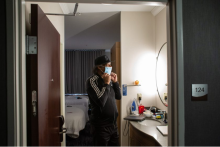By LSJ Student Communications Assistant, Katie Pattenaude
If one thing has been made clear during the COVID-19 pandemic, it is the stark socioeconomic disparity that exists in our current system and its subsequent impact on health outcomes.
People living unsheltered have been left particularly vulnerable during this pandemic. With some services closed, many individuals have not been able to access the support they need.
This gap in care required a creative solution. This is where a new collaborative initiative called JustCARE stepped in.
Developed in the context of a global pandemic and the intensification of the movement for racial justice, JustCARE is a novel collective impact model that simultaneously reduces unsheltered homelessness, barriers to health care, and the harm caused by the criminal legal system - even as it improves public safety and neighborhood quality of life.
JustCARE was born in the fall of 2020 when community partners worked together to launch a collaborative new initiative that provides supportive interim housing to people contending with homelessness, behavioral health challenges, and criminal legal system involvement. Throughout its operations, JustCARE draws on the harm reduction philosophy and employs a racial equity lens to ensure that the intervention mainly benefits racialized and marginalized people.
Together with four UW graduate students and a UW research scientist, LSJ Professor Katherine Beckett has been working with the organizations that created and implement JustCARE since the spring of 2020.
Beckett and her co-authors have conducted nearly 100 interviews with 41 JustCARE participants, who were placed in hotels after living on the streets. Participants share about their background, their experience of being unhoused, and what their goals are moving forward. The team also interviewed community partners, outreach responders, and stakeholders.
Beckett explains that before COVID-19, no one ever thought to use motels and hotels to house chronically unhoused people. However, the JustCARE model has been extremely successful.
“One thing that stakeholders have learned is that people do a lot better when they have their own rooms. It's a lot better than congregate shelters,” Beckett expressed. “People like to feel like they have privacy, and they can keep themselves and their belongings secure.”
Beckett hopes that people can learn from what JustCARE has accomplished and begin to model more services off of their housing-first, harm reduction, and holistic approach to the homelessness crisis. She believes that JustCARE is unique in that it is not just a housing program, but also a public health, behavioral health, and public safety initiative, addressing safety issues in neighborhoods without any reliance on police or the criminal legal system.
LSJ alum Ramon Hernandez (2020) has also been involved with this work since the start of the COVID-19 pandemic. While finishing up his last quarters at UW in online school, Hernandez was simultaneously learning how to be an Outreach Responder for Co-LEAD, one of the main organizations participating in JustCARE.
Hernandez explains that at the start of the pandemic, King County Jail and other local jails were releasing individuals in an effort to reduce the spread of COVID-19. Many of Co-LEAD’s initial placements that Hernandez worked with came from these populations.
As with all participants, Co-LEAD’s first step in helping to stabilize these individuals was to connect them to housing. After securing housing, Co-LEAD would assess their needs and provide wraparound services, including food and clothing. Once individuals stabilized, they would be connected to intensive case management and resources for substance abuse or mental illness.
“That’s when the real work would start,” Hernandez said. “[Supporting their basic needs first] put them in a better position to reconnect with their mental health.”
Hernandez says that his background as a formerly incarcerated individual has shaped his experience working for Co-LEAD and JustCARE
“I have lived experience. I, myself, have been formerly incarcerated. It has been fulfilling to be helping individuals that have experienced the same kind of life,” Hernandez shares.
Since his original position as Outreach Responder at Co-LEAD, Hernandez has been promoted to Shift Lead, and now to Program Manager at JustCare.
Hernandez says that working with Co-LEAD and JustCare has tremendously shifted the way he thinks about homelessness policy in Seattle.
“The policies we have in place don’t work. Sweeping people is not a long-term solution. Long-term solutions come when you're able to provide somebody with intensive case management,” Hernandez said. “Just housing isn’t the solution. There has to be intensive case management tied in- getting folks connected to healthcare, and meeting people where they’re at.”
Hernandez hopes to continue making a difference working on the ground as well as advocating for Co-LEAD with stakeholders, all in an effort to end homelessness in Seattle.
“I’m in a really good position for that with my new job,” Hernandez said.
